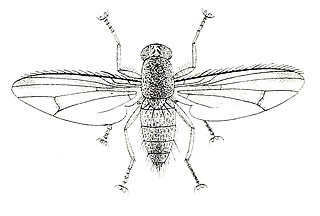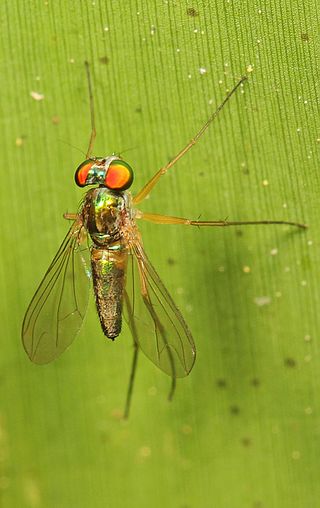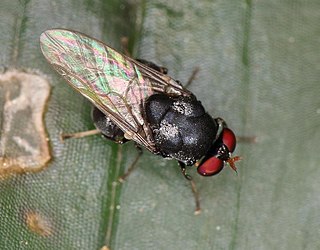
The Tipulomorpha are an infraorder of Nematocera, containing the crane flies, a very large group, and allied families.

The Anthomyiidae are a large and diverse family of Muscoidea flies. Most look rather like small houseflies, but are commonly drab grey. The genus Anthomyia, in contrast, is generally conspicuously patterned in black-and-white or black-and-silvery-grey. Most are difficult to identify, apart from a few groups such as the kelp flies that are conspicuous on beaches.

The conopid genus Stylogaster is a group of unusual flies. It is the only genus in the subfamily Stylogastrinae, which some authorities have historically treated as a separate family Stylogastridae.

The Curtotonidae or quasimodo flies are a small family of small grey to dark brown humpbacked flies (Diptera) with a worldwide distribution, but with very few species in the Nearctic, Australasian/Oceanian, and Palaearctic regions. Most members of the family are found in tropical to subtropical latitudes in Africa and the Neotropics. Many remain undescribed in collections, since little work on the family has been done since the 1930s.

Rhagionidae or snipe flies are a small family of flies. They get their name from the similarity of their often prominent proboscis that looks like the beak of a snipe.

Toxophora is a genus of flies belonging to the family Bombyliidae (bee-flies). There are 47 described species, distributed throughout the world, although they are most abundant in Southwestern United States and western Mediterranean. World catalog of bee flies They are strange, stout, robust flies with a hunchbacked form, with a body length of 6–12 mm and wings 4 to 7.5mm. Most species are black with banding or spots.
Marriottella is a genus of tephritid or fruit flies in the family Tephritidae.

Metasphenisca is a genus of fruit flies in the family Tephritidae. There are at least 25 described species in the Afrotropical and Oriental Regions. Of these, 20 occur in the continental Afrotropics and two are confined to Madagascar; three species occur in the Arabian Peninsula.
Cemocarus is a genus of flies in the family Dolichopodidae. It is known from South Africa and Namibia.
Dactylonotus is a genus of flies in the family Dolichopodidae. Six of the species in the genus are found in southern Africa, though one species, Dactylonotus formosus, is found in New Zealand.
Nurteria is a genus of flies in the family Dolichopodidae, found in the Afrotropical realm. Three species are currently known in the genus, but there are also numerous undescribed species of the genus from southern Africa. It was originally described in the subfamily Diaphorinae, though it possesses some features of the Sympycninae.
Tenuopus is a genus of flies in the family Dolichopodidae. It is the only genus in the subfamily Tenuopodinae, which was created by Igor Grichanov in 2018. The genus was previously placed in the subfamily Neurigoninae, and it also shares some features of Peloropeodinae and Sciapodinae. All species are known from the Afrotropical realm.

The Syrphini are a tribe of hoverflies.

Rhagioninae is a worldwide subfamily of predatory snipe flies.
Brian Roy Stuckenberg was a South African entomologist who specialised in Diptera.
Pseudargyrochlamys is a genus of fly in the family Dolichopodidae. It was established by Igor Grichanov in 2006, for four species of Paracleius from South Africa. A fifth species was described in 2020.
Pseudoparaclius is a genus of flies in the family Dolichopodidae. It was established by Igor Grichanov in 2006, for 14 species from Africa that were originally placed in Paracleius. Two additional species were described in 2015 and 2020.

Tephritini is a tribe of fruit flies in the family Tephritidae. There are about 80 genera and some 1000 described species in Tephritini.

Chrysosomatini is a tribe of flies in the family Dolichopodidae.

Ageiton is a monotypic genus of flies in the family Stratiomyidae. It is endemic to the Afrotropics, where it is widespread. The only species, Ageiton ater is black with short silver hairs (setae). It is similar to the three species of Cardopomyia, which are found in Madagascar.











